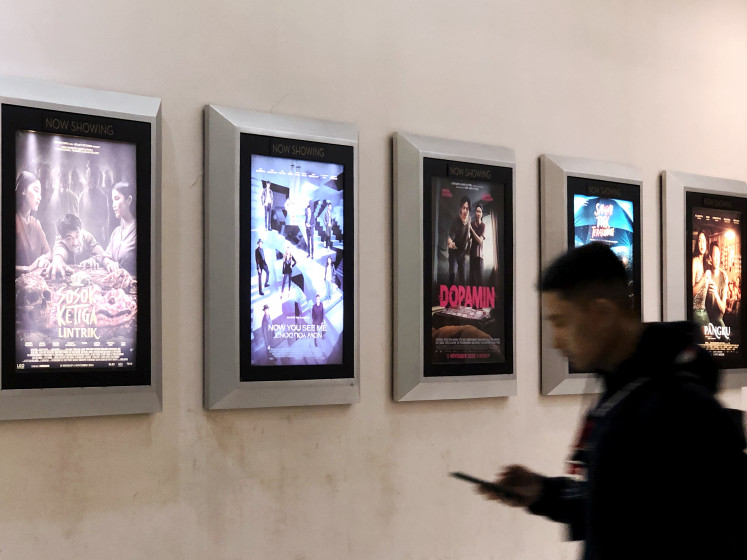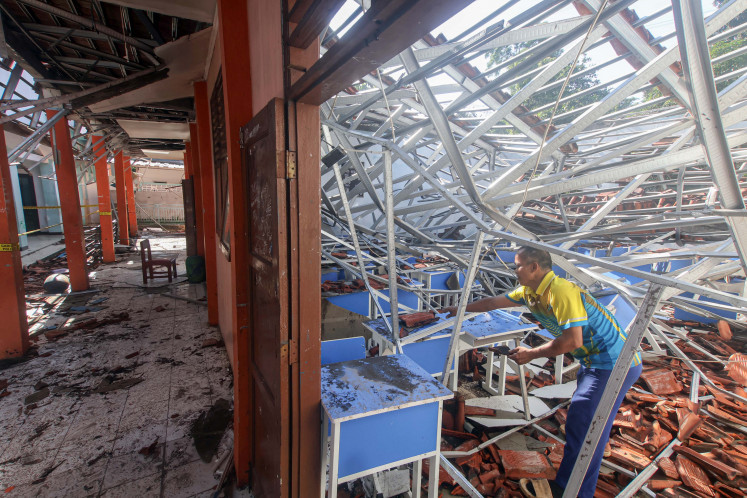Popular Reads
Top Results
Can't find what you're looking for?
View all search resultsPopular Reads
Top Results
Can't find what you're looking for?
View all search resultsCandidates struggle to meet hidden costs
Flying high: Ten-year-old Surung (right) and Kiki, 8, train doves as the flags of political partys fly in their neighborhood of Pulo Gadung, East Jakarta
Change text size
Gift Premium Articles
to Anyone
Flying high: Ten-year-old Surung (right) and Kiki, 8, train doves as the flags of political partys fly in their neighborhood of Pulo Gadung, East Jakarta. The National Commission for Elections recently said that 30 out of 267 subdistricts in the capital were considered as area likely to see conflict ahead of the elections. JP/J. Adiguna
Twenty-five days before the legislative election takes place, the candidates have been doing everything possible to win over voters.
But with more than 500,000 candidates competing for 560 seats in the House of Representatives (DPR), 132 seats on the Regional Representatives Council (DPD) and more than 16,000 seats at the provincial, regency and municipal level, the battle is hard and can be very expensive.
In Riau, a candidate was recently caught selling ecstasy. Another, in Bali, was involved in illegal logging. In Banten, one wannabe stole palm fruit, while a desperate candidate in Jakarta was caught red-handed stealing a motorcycle. All sung in chorus that they did it to fund their campaigning.
Effendi Gazali, a political communications expert, said such a level of competition has never been seen before and that money politics were rampant.
“The competition is already at abnormal level. If one candidate comes with money, our public will expect other candidates to give money too. So there is a system that are done by a small group of people which make others have to follow the same platform – that is the platform of distributing money.
“Of course it is effective to talk and listen to the people, but the candidates need more time, better equipment and good communication skills. So some just distribute money,” Effendi said.
Eva Sundari, a legislator who is running for a second term, feels it.
“This is the bloodiest election I’ve ever seen. I think I won’t join the next election if this is the way. It is so different now,” she said on the road for her campaign.
Campaigning from dawn to dusk to visit five places a day is no longer enough to win over the masses.
“In 2004, people were happy enough when I visited and listen to them. Now they always ask for money or gifts. I have made it clear that I will not give any money but the pressure forces me to give some communal gifts like chairs and plaited mats for the village office,” she said.
“But the hard part is not the physical but financial. My savings are almost gone now – considering I have planned my expenses and paced my campaign,” she said.
She has allocated Rp 500 million (US$42,000) for her campaign and has used them up three weeks before voting day.
“I have to slow the expenses down. I do not want to be out of steam at the last minute. But it certainly will be over the budget and dig deep into my pocket. Another candidate I know has spent the terrifying amount of Rp 1 billion,” she said.
The unexpected expenses, on top of the communal gifts, have come in the form of big posters and t-shirts.
“I only printed 200 posters.
Actually I printed much less because I knew banners were not efficient and I wanted to
reach the voters personally. But apparently when I came to my constituent and my supporters demanded my poster to match other candidates. They said it was necessary to help them campaign for me,” she said.
“Giving t-shirts is apparently another unexpected crucial weapon. So many other parties are handing out t-shirts that even my supporters feel that it was a must for me to give them too,” she said.
She said the new system has made the competition harder.
“Now everyone goes campaigning. In the past only people at the top of the list did so. Some take the easy way out by handing out money but it has changed people’s mentality. Now all they expect is money,” she said.
Most candidates have to cover these costs themselves.
“We do not depend on posters and banners because they are expensive and do not have a huge impact because people are sick of them. They would prefer the candidates to come directly to them and we have a lot of cadets who have access to local leaders so we do not have to use money,” The Prosperous Justice Party’s head of general elections Muhammad Razikun said.
“The funding for the candidates comes from themselves and their supporters and party. But the largest amount comes from the supporters,” Razikun said.
Chairman of the National Mandate Party (PAN) Soetrisno Bachir said the party was better prepared as they have used a voting system since 2006 so they do not have many internal conflicts and had come out with tactics.
“Everyday they should sleep over at local houses, not their own houses. They must go around. The party (PAN) helps with advertising and attributes,” he said.
Overall, parties, big and small, have a long list of candidates for each constituency, something Effendi cited as another source of unnecessary competition.
“Realistically they [the party] may not even gain more than two seats but they have a long list of candidates. They can be vote gatherers but it has made the competition so fierce, not only between different parties but also within parties,” Effendi said.
He suggested that a higher minimum electoral or parliamentary threshold for political parties to participate in elections is needed.
“People can setup their own parties but when it comes to election time, the entry threshold should be high so we can reduce unnecessary competition among the candidates and sort out unqualified candidates,” he said.
“There should also be strict oversight of the source and use of campaign funds. If a party breaks the regulations, they should be barred from election. Now it is not even possible because we have so many parties and we do not have the system. It should be a long national discussion,” he said.










